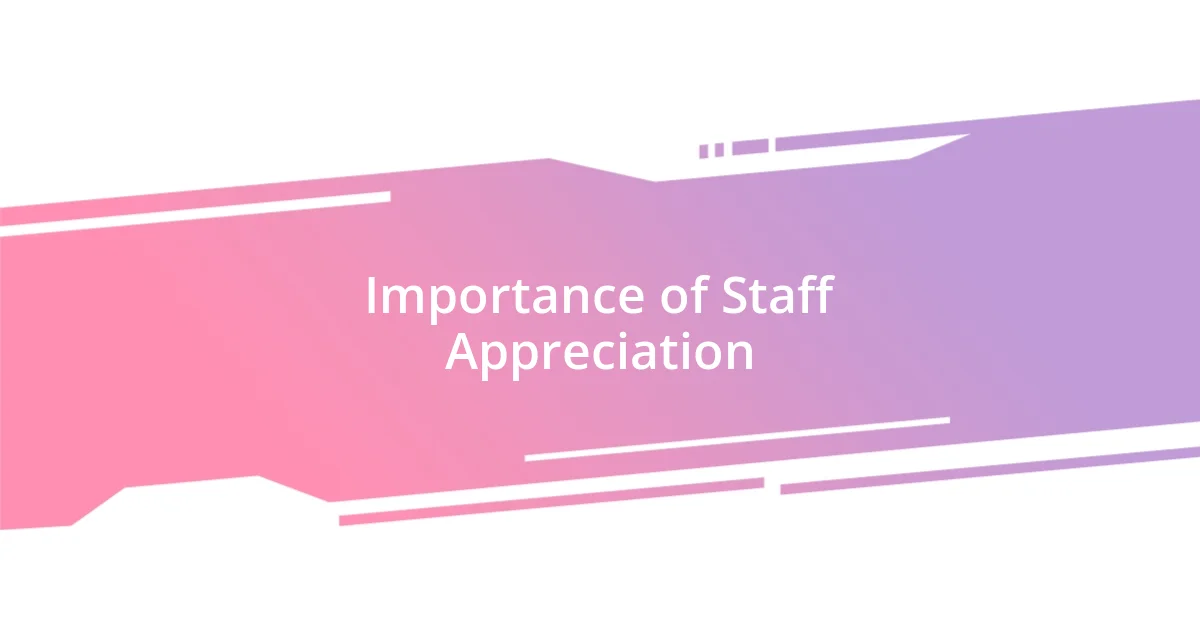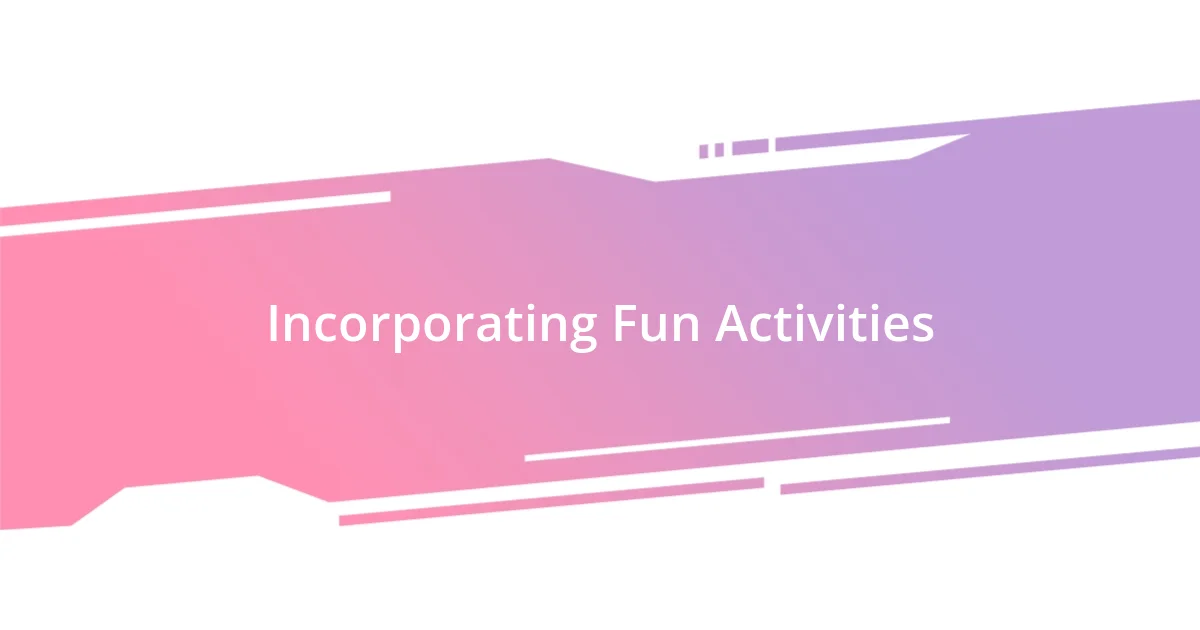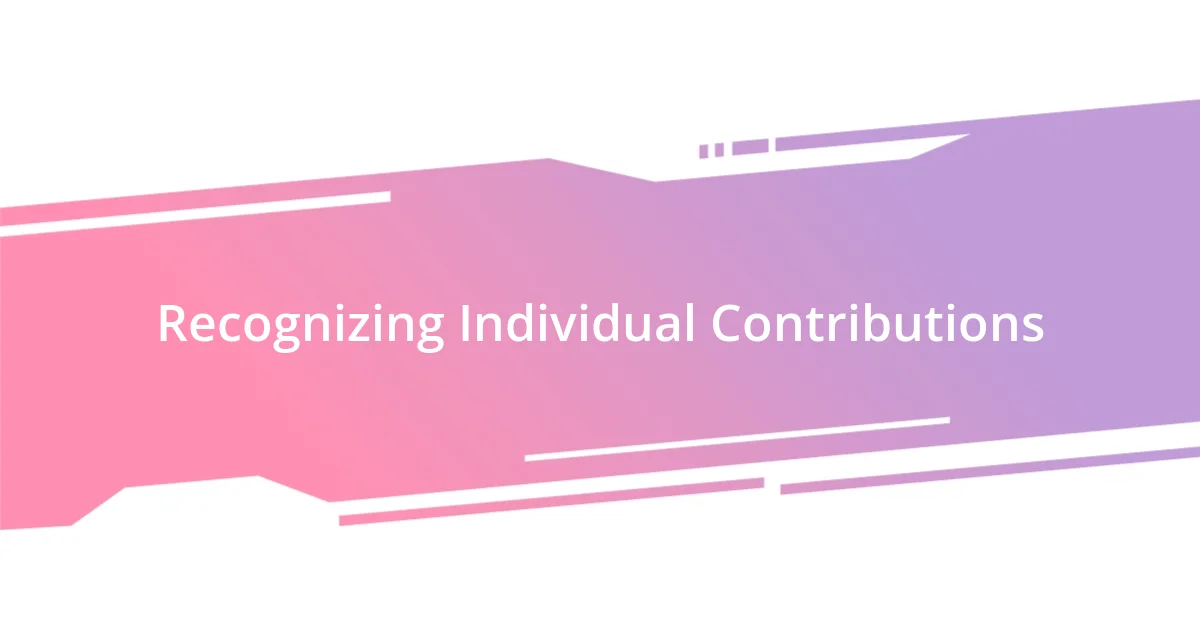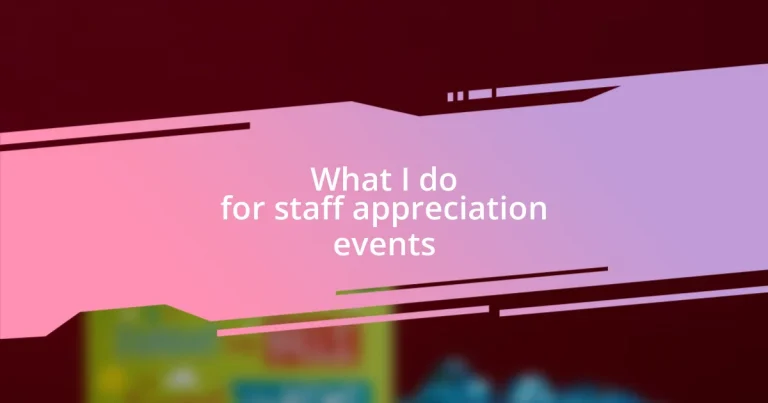Key takeaways:
- Recognizing employees fosters trust, loyalty, and higher engagement, ultimately enhancing organizational success.
- Effective appreciation events should align with team interests and involve thoughtful planning, including budgeting and scheduling for maximum participation.
- Personalized recognition and peer acknowledgment significantly boost morale, encouraging a supportive workplace culture.

Importance of Staff Appreciation
Recognizing employees for their hard work isn’t just a nice gesture—it’s essential for fostering a positive workplace culture. I remember the first time I received a handwritten note from my manager, acknowledging my late-night efforts on a project. The simple appreciation instantly lifted my spirits and pushed me to go even further. How many times have you felt motivated simply because someone noticed your effort? It’s moments like these that build trust and loyalty within a team.
When staff feel valued, their engagement levels skyrocket. I’ve personally witnessed a significant shift in morale after hosting appreciation events. The energy in the room was infectious, and it’s incredible what a little recognition can do. Have you ever noticed how even a small “thank you” can brighten someone’s day? This type of atmosphere encourages collaboration and innovation, leading to greater productivity and a more successful organization.
Moreover, appreciation has a profound impact on employee retention. I’ve seen talented individuals leave companies simply because they felt overlooked. Reflecting on my own career, I’ve always stuck around longer at organizations where my contributions were recognized. Isn’t it worth investing in a culture of appreciation to keep talent on board? Understanding this importance can transform how we approach our relationships with staff and ultimately lead us to success.

Planning Effective Appreciation Events
Planning effective appreciation events can feel like a daunting task, but the key lies in understanding your team’s preferences. I once organized a surprise pizza party for my colleagues, and the excitement was palpable as they entered the break room. Seeing their delighted faces reminded me that it’s often the simple, thought-out gestures that resonate the most. What are some of your team’s favorite treats or activities? You might be surprised how a little creativity can turn an ordinary day into a cherished memory.
Creating a budget is another critical element in planning these events. I recall stretching a small budget to host a game night, incorporating potluck dishes that everyone contributed. This not only reduced costs but also fostered a sense of community as colleagues shared their culinary talents. Have you considered leveraging resources already at your disposal? Finding ways to make the event feel special without breaking the bank is essential, and collaboration among staff can often lead to surprising and delightful results.
Finally, setting a date that accommodates everyone shows you value their time. I remember trying to host an appreciation lunch, only to find half my team couldn’t attend due to scheduling conflicts. The outcome? A fun idea that fizzled. Asking for input on preferred days or times can dramatically increase participation and enthusiasm. How do you usually gauge availability for events? Utilizing surveys can work wonders in ensuring that everyone feels included and excited about showing up.
| Event Type | Advantages |
|---|---|
| Food-Centric Gatherings | Encourages a relaxed atmosphere and fosters bonding over shared meals. |
| Interactive Activities | Promotes teamwork and adds an element of fun to the appreciation message. |
| Surprise Events | Creates a sense of excitement and can make employees feel valued and recognized. |

Choosing the Right Theme
When it comes to choosing the right theme for staff appreciation events, I’ve learned that aligning the theme with your team’s interests and company culture is crucial. A few years ago, I organized a “Decades Day” where everyone dressed up in attire reflecting their favorite decade. The laughter and nostalgia in the room made it clear that tapping into personal experiences can create memorable moments. What’s your team passionate about? Understanding those interests can guide you in selecting a theme that resonates deeply with everyone.
Here are some popular themes that can enhance the experience:
- Wellness Day: Focuses on employee health with yoga sessions, meditation, or healthy cooking demos.
- Local Culture Celebration: Highlights regional foods, music, and traditions, emphasizing community ties.
- Outdoor Adventure: Emphasizes fun activities like a picnic, hikes, or team sports, promoting physical and emotional well-being.
- The Great Escape: Organizes a team-building escape room event that fosters collaboration and communication.
- Retro Game Night: Includes board games or video games from childhood, sparking friendly competition and nostalgia.
The right theme can transform an appreciation event into something your team genuinely looks forward to, making it more than just a routine gathering. I find that themes that allow for creativity and personal expression can often lead to the most engaging and enjoyable events.

Incorporating Fun Activities
Incorporating fun activities into staff appreciation events can really elevate the experience. I vividly remember a team scavenger hunt I organized that not only got everyone outside but also created hilarious moments that we still talk about. It was fascinating to see how this experience broke down barriers and sparked conversations between colleagues who wouldn’t normally interact. Isn’t it amazing how a little friendly competition can unite a team?
Games don’t have to be elaborate to be effective. I once set up a mini-Olympics in our office courtyard, complete with simple themes like paper airplane contests and speed folding competitions. The laughter was infectious as colleagues cheered and encouraged one another. When people engage in lighthearted challenges, it often uncovers hidden talents and fosters camaraderie that enhances the workplace atmosphere. Have you thought about what types of fun activities could reveal these talents within your team?
Moreover, incorporating arts and crafts can be a fantastic way to bring out creativity. I’ve hosted painting sessions where team members could channel their inner artists while sipping on some drinks, and the results were both impressive and delightful. It surprised me how many people enjoyed expressing themselves in this way, and it made for a fun and relaxed environment. How do you think a creative outlet could impact your team’s dynamics? By providing activities that allow self-expression, you not only honor your staff but also promote team bonding in a joyful manner.

Recognizing Individual Contributions
Recognizing individual contributions is a powerful way to foster a culture of appreciation within the workplace. I remember a particular instance when our company celebrated employee anniversaries with personalized shout-outs during a team meeting. Hearing my colleague’s name called out, along with heartfelt anecdotes of his contributions, not only boosted his spirits but also inspired everyone else in the room. Have you considered how acknowledging specific achievements can enhance motivation among your team members?
I find that a touch of personalization makes all the difference. One year, I created custom certificates highlighting each person’s unique skills or accomplishments, which we presented during a casual lunch. The joy and surprise on their faces were priceless! It’s fascinating how small, thoughtful gestures can create a ripple effect, encouraging a supportive atmosphere. What creative methods could you employ to celebrate individual efforts in your workplace?
Additionally, I’ve learned that peer recognition can significantly impact morale. Hosting an event where team members can nominate each other for awards not only builds camaraderie but also emphasizes the value of teamwork. At one of these events, I was genuinely moved by how colleagues pointed out qualities or contributions they admired in one another. Isn’t it remarkable when employees recognize and celebrate each other’s strengths? By facilitating this kind of interaction, we nurture a sense of belonging and appreciation that resonates beyond the event itself.

Budgeting for Appreciation Events
When budgeting for appreciation events, it’s crucial to balance costs with the desire to create memorable experiences. One year, I allocated a modest budget for our annual appreciation day, and I felt torn between a lavish event and a more personal touch. Ultimately, I opted for a small venue and a unique theme, allowing us to invest in meaningful interactions rather than flashy decorations. This taught me that the heart of an appreciation event lies in the connections made, rather than how much you spend.
I’ve learned to prioritize what truly matters in these events. For instance, hosting a potluck not only saved us money but also showcased the diverse talents of our team. Each dish brought personal stories and flavors to the table, literally! This shared experience turned out to be a bonding moment, reminding me that appreciation doesn’t require extravagance but rather thoughtfulness.
It’s essential to anticipate other costs beyond the basic event setup, too. I often set aside funds for unexpected expenses—like grabbing a last-minute cake or providing small tokens of appreciation. Once, I forgot to consider the cost of extra supplies for an impromptu art session, which left me scrambling last minute. Have you ever faced a last-minute budget surprise? Planning for contingencies has become my new mantra to ensure our events remain enjoyable and stress-free, no matter how they unfold.

Evaluating Event Success
Evaluating the success of staff appreciation events is more than just counting attendance; it’s about gauging the genuine impact made on the team. For me, I always follow up with a simple survey after each event to capture the feelings and feedback of participants. I recall one event where we received unexpectedly heartfelt comments about how the activities fostered stronger connections. Have you ever considered how valuable that immediate feedback can be for planning future events?
In another instance, we implemented an informal “post-mortem” discussion a week after an appreciation event. During this gathering, team members shared what resonated with them and what didn’t. I remember one colleague stating how a few moments of open sharing led to a deeper sense of belonging. It’s interesting to see how those candid conversations can unveil insights that numbers alone can’t explain—how often do we underestimate the power of dialogue?
Emotional engagement is the real litmus test for success. Once, after a particularly engaging event that included a fun team-building activity, I noticed employees talking about their experiences long after the day ended. This ongoing buzz confirmed that the event not only created memories but also reinforced our team’s bond. How do you determine whether your events leave lasting impressions? For me, it’s all about the stories shared and the connections strengthened in the days that follow.














